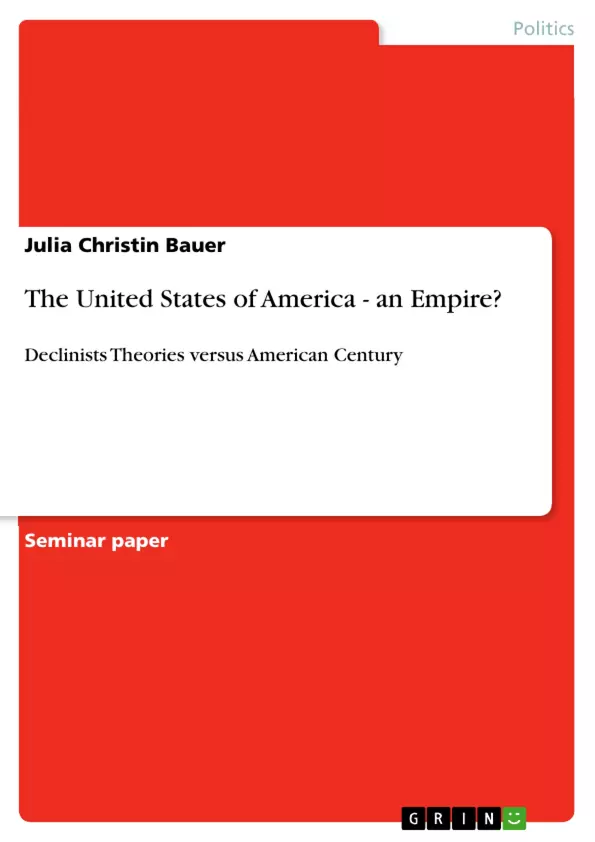The end of the 1980s gave rise to many thoughts about the decline of the United States of America. In 1987, Paul Kennedy’s theory of a certain inevitable ending for all great powers was often applied to the USA. Furthermore, former US Secretary of State and 1973 Nobel Prize winner, Henry Kissinger, argued that America’s Cold War success was “far more costly for the USA than it could have been.” Only about a decade later, at the end of the 1990s, however, Henry Luce’s vision of the USA as a world power experienced a sort of renaissance since 1941, when this vision first arose. Below, I would like to take a closer look at this transformation of perceptions of the United States.
In the late 1980s, “declinists” were certainly not short of incidents proving their rather pessimistic outlook on America’s future. In the process of naming some of them, I would like to start with the 1970s, where the US retreat from Vietnam, 58,000 dead American soldiers, and defeat by a Third World country portrayed a great surrender of American power to a communist country. The sentiments of grief, anger, and regret over Vietnam influenced the following years immensely and was also an incentive to a less muscular foreign policy. Furthermore, President Richard Nixon’s resignation in August 1974 due to his “abuses of governmental power” in the Watergate scandal caused a lack of confidence in American politicians and symbolized the ending of a presidency often referred to as imperial. [...]
Inhaltsverzeichnis (Table of Contents)
- Essay I
- The Decline of the United States of America in the 1980s
- The Rise of the American Century in the 1990s
- The US Economy in the 1990s
- The Transformation of Ideas about the USA
- The American Empire
Zielsetzung und Themenschwerpunkte (Objectives and Key Themes)
This essay examines the perception of the United States in the 1980s and 1990s, analyzing the factors that contributed to the shift from a perceived decline to the rise of the "American Century." The essay delves into the economic, political, and social factors that influenced this transformation.
- The decline of the United States in the 1980s
- The rise of the American Century in the 1990s
- The role of economic factors in shaping perceptions of the United States
- The impact of foreign policy and military power
- The question of whether the United States is an empire
Zusammenfassung der Kapitel (Chapter Summaries)
The essay starts by outlining the prevailing belief in the 1980s that the United States was in decline, citing evidence such as the Vietnam War, the Watergate scandal, and economic difficulties. It then explores the factors that led to a shift in perception in the 1990s, including economic recovery, the end of the Cold War, and successful military interventions.
The essay further discusses the economic boom of the 1990s and its impact on the perception of the United States. It highlights the emergence of the Internet and the rise of globalization. Finally, the essay explores the question of whether the United States can be considered an empire, analyzing its influence on global politics, economics, and ideology.
Schlüsselwörter (Keywords)
Key themes and concepts explored in the essay include the rise and fall of empires, economic cycles, foreign policy, military intervention, globalization, and the definition of an empire. The essay analyzes the perception of the United States as a declining power in the 1980s and its transformation into a dominant force in the 1990s.
Frequently Asked Questions
Why was the USA perceived as a declining power in the 1980s?
Factors included the retreat from Vietnam, the Watergate scandal, and theories like Paul Kennedy's regarding the inevitable end of great powers.
What led to the "American Century" renaissance in the 1990s?
Economic recovery, the end of the Cold War, successful military interventions, and the rise of the Internet contributed to a renewed sense of power.
How did the Watergate scandal affect the US presidency?
It caused a significant lack of confidence in politicians and symbolized the end of what was often referred to as an "imperial presidency."
Is the United States considered an empire?
The essay analyzes this question by looking at US influence on global politics, economics, and ideology during the late 20th century.
What role did the 1990s economy play in global perception?
The economic boom and the leadership in globalization repositioned the USA as the dominant global force after the pessimism of the previous decade.
- Quote paper
- BA Julia Christin Bauer (Author), 2006, The United States of America - an Empire?, Munich, GRIN Verlag, https://www.grin.com/document/118854



